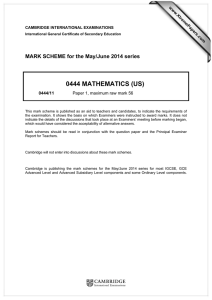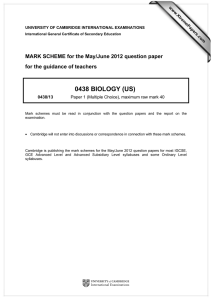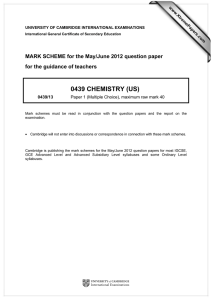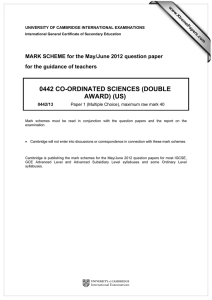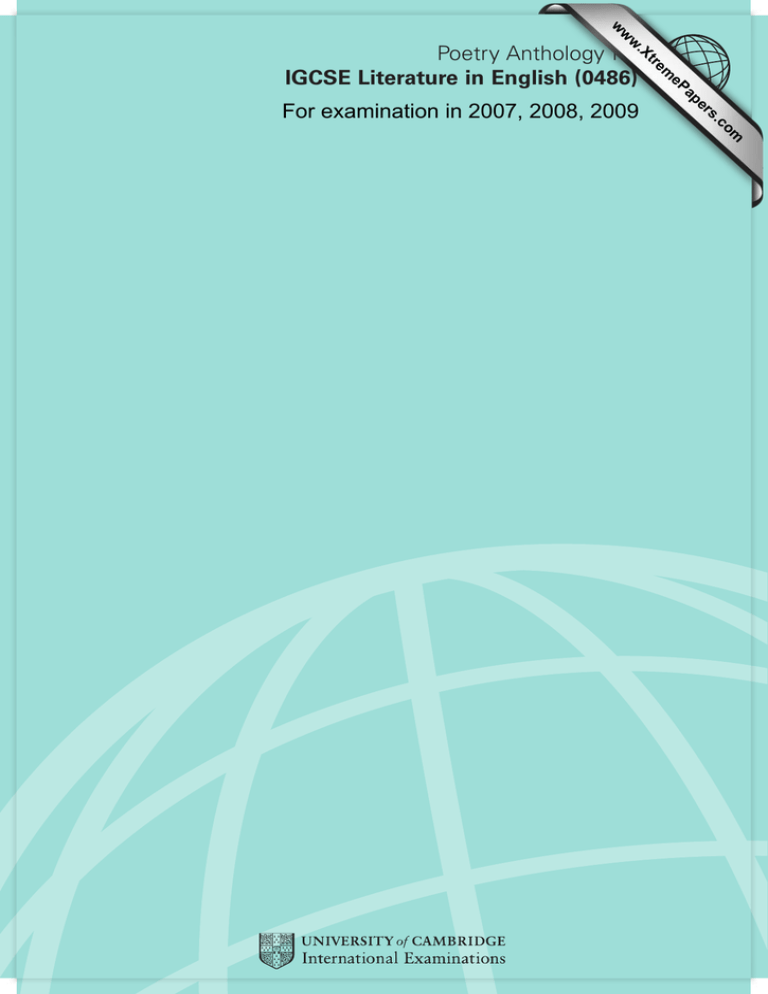
w
w
w
ap
eP
om
.c
s
er
For examination in 2007, 2008, 2009
m
e
tr
.X
Poetry Anthology for
IGCSE Literature in English (0486)
Caged Bird
Maya Angelou
A free bird leaps
on the back of the wind
and floats downstream
till the current ends
and dips his wing
in the orange sun’s rays
and dares to claim the sky.
But a bird that stalks
down his narrow cage
can seldom see through
his bars of rage
his wings are clipped and
his feet are tied
so he opens his throat to sing.
The caged bird sings
with a fearful trill
of things unknown
but longed for still
and his tune is heard
on the distant hill
for the caged bird
sings of freedom.
The
and
and
and
free bird thinks of another breeze
the trade winds soft through the sighing trees
the fat worms waiting on a dawn-bright lawn
he names the sky his own.
But a caged bird stands on the grave of dreams
his shadow shouts on a nightmare scream
his wings are clipped and his feet are tied
so he opens his throat to sing.
University of Cambridge International Examinations
Poetry Anthology for IGCSE Literature in English (0486)
5
10
15
20
25
30
The caged bird sings
with a fearful trill
of things unknown
but longed for still
and his tune is heard
on the distant hill
for the caged bird
sings of freedom.
University of Cambridge International Examinations
Poetry Anthology for IGCSE Literature in English (0486)
35
Rising Five
Norman Nicholson
‘I’m rising five’, he said,
‘Not four’, and little coils of hair
Un-clicked themselves upon his head.
His spectacles, brimful of eyes to stare
At me and the meadow, reflected cones of light
Above his toffee-buckled cheeks. He’d been alive
Fifty-six months or perhaps a week more:
not four,
But rising five.
Around him in the field the cells of spring
Bubbled and doubled; buds unbuttoned; shoot
And stem shook out the creases from their frills,
And every tree was swilled with green.
It was the season after blossoming,
Before the forming of the fruit:
not May,
But rising June.
5
10
15
And in the sky
The dust dissected tangential light:
not day,
20
But rising night;
not now,
But rising soon.
The new buds push the old leaves from the bough.
We drop our youth behind us like a boy
25
Throwing away his toffee-wrappers. We never see the flower,
But only the fruit in the flower; never the fruit,
But only the rot in the fruit. We look for the marriage bed
In the baby’s cradle, we look for the grave in the bed:
not living, 30
But rising dead.
University of Cambridge International Examinations
Poetry Anthology for IGCSE Literature in English (0486)
Little Boy Crying
Mervyn Morris
Your mouth contorting in brief spite and
Hurt, your laughter metamorphosed into howls,
Your frame so recently relaxed now tight
With three-year-old frustration, your bright eyes
Swimming tears, splashing your bare feet,
You stand there angling for a moment’s hint
Of guilt or sorrow for the quick slap struck.
The ogre towers above you, that grim giant,
Empty of feeling, a colossal cruel,
Soon victim of the tale’s conclusion, dead
At last. You hate him, you imagine
Chopping clean the tree he’s scrambling down
Or plotting deeper pits to trap him in.
You cannot understand, not yet,
The hurt your easy tears can scald him with,
Nor guess the wavering hidden behind that mask.
This fierce man longs to lift you, curb your sadness
With piggy-back or bull-fight, anything,
But dare not ruin the lessons you should learn.
You must not make a plaything of the rain.
University of Cambridge International Examinations
Poetry Anthology for IGCSE Literature in English (0486)
5
10
15
20
Carpet-weavers, Morocco
Carol Rumens
The children are at the loom of another world.
Their braids are oiled and black, their dresses bright.
Their assorted heights would make a melodious chime.
They watch their flickering knots like television.
As the garden of Islam grows, the bench will be raised.
Then they will lace the dark-rose veins of the tree-tops.
5
The carpet will travel in the merchant’s truck.
It will be spread by the servants of the mosque.
Deep and soft, it will give when heaped with prayer.
The children are hard at work in the school of days.
From their fingers the colours of all-that-will-be fly
and freeze into the frame of all-that-was.
University of Cambridge International Examinations
Poetry Anthology for IGCSE Literature in English (0486)
10
Song to the Men of England
Percy Bysshe Shelley
I
Men of England, wherefore plough
For the lords who lay ye low?
Wherefore weave with toil and care
The rich robes your tyrants wear?
II
Wherefore feed, and clothe, and save,
From the cradle to the grave,
Those ungrateful drones who would
Drain your sweat – nay, drink your blood?
III
Wherefore, Bees of England, forge
Many a weapon, chain, and scourge,
That these stingless drones may spoil
The forced produce of your toil?
IV
Have ye leisure, comfort, calm,
Shelter, food, love’s gentle balm?
Or what is it ye buy so dear
With your pain and with your fear?
V
The
The
The
The
seed ye sow, another reaps;
wealth ye find, another keeps;
robes ye weave, another wears;
arms ye forge, another bears.
VI
Sow seed, – but let no tyrant reap;
Find wealth, – let no impostor heap;
Weave robes, – let not the idle wear;
Forge arms, – in your defence to bear.
University of Cambridge International Examinations
Poetry Anthology for IGCSE Literature in English (0486)
5
10
15
20
VII
Shrink to your cellars, holes, and cells;
In halls ye deck another dwells.
Why shake the chains ye wrought? Ye see
The steel ye tempered glance on ye.
VIII
With plough and spade, and hoe and loom,
Trace your grave, and build your tomb,
And weave your winding-sheet, till fair
England be your sepulchre.
University of Cambridge International Examinations
Poetry Anthology for IGCSE Literature in English (0486)
25
30
From Spectator Ab Extra
Arthur Hugh Clough
As I sat at the Café I said to myself,
They may talk as they please about what they call pelf,
They may sneer as they like about eating and drinking,
But help it I cannot, I cannot help thinking
How pleasant it is to have money, heigh-ho!
How pleasant it is to have money.
I sit at my table en grand seigneur,
And when I have done, throw a crust to the poor;
Not only the pleasure itself of good living,
But also the pleasure of now and then giving:
So pleasant it is to have money, heigh-ho!
So pleasant it is to have money.
They may talk as they please about what they call pelf,
And how one ought never to think of one’s self,
How pleasures of thought surpass eating and drinking, –
My pleasure of thought is the pleasure of thinking
How pleasant it is to have money, heigh-ho!
How pleasant it is to have money.
University of Cambridge International Examinations
Poetry Anthology for IGCSE Literature in English (0486)
5
10
15
Monologue
Hone Tuwhare
I like working near a door. I like to have my work-bench
close by, with a locker handy.
Here, the cold creeps in under the big doors, and in the
summer hot dust swirls, clogging the nose. When the
big doors open to admit a lorry-load of steel,
conditions do not improve. Even so, I put up with it,
and wouldn’t care to shift to another bench, away from
the big doors.
As one may imagine this is a noisy place with smoke
rising, machines thumping and thrusting, people
kneading, shaping, and putting things together.
Because I am nearest to the big doors I am the farthest
away from those who have to come down to shout
instructions in my ear.
5
10
I am the first to greet strangers who drift in through the
open doors looking for work. I give them as much
information as they require, direct them to the offices,
and acknowledge the casual recognition that one
worker signs to another.
15
I can always tell the look on the faces of the successful
ones as they hurry away. The look on the faces of the
unlucky I know also, but cannot easily forget.
20
University of Cambridge International Examinations
Poetry Anthology for IGCSE Literature in English (0486)
I have worked here for fifteen months.
It’s too good to last.
Orders will fall off
and there will be a reduction in staff.
More people than we can cope with
will be brought in from other lands:
people who are also looking
for something more real, more lasting,
more permanent maybe, than dying. . . .
I really ought to be looking for another job
before the axe falls.
These thoughts I push away, I think that I am lucky
to have a position by the big doors which open out
to a short alley leading to the main street; console
myself that if the worst happened I at least would
have no great distance to carry my gear and tool-box
off the premises.
I always like working near a door. I always look for a
work-bench hard by – in case an earthquake
occurs and fire breaks out, you know?
University of Cambridge International Examinations
Poetry Anthology for IGCSE Literature in English (0486)
25
30
35
40
Before the Sun
Charles Mungoshi
Intense blue morning
promising early heat
and later in the afternoon,
heavy rain.
The bright chips
fly from the sharp axe
for some distance through the air,
arc,
and eternities later,
settle down in showers
on the dewy grass.
It is a big log:
but when you are fourteen
big logs
are what you want.
5
10
15
The wood gives off
a sweet nose-cleansing odour
which (unlike sawdust)
doesn’t make one sneeze.
It sends up a thin spiral
of smoke which later straightens
and flutes out
to the distant sky: a signal
of some sort,
or a sacrificial prayer.
The wood hisses,
The sparks fly.
And when the sun
finally shows up
University of Cambridge International Examinations
Poetry Anthology for IGCSE Literature in English (0486)
20
25
in the East like some
latecomer to a feast
I have got two cobs of maize
ready for it.
I tell the sun to come share
with me the roasted maize
and the sun just winks
like a grown-up.
So I go ahead, taking big
alternate bites:
one for the sun,
one for me.
This one for the sun,
this one for me:
till the cobs
are just two little skeletons
in the sun.
University of Cambridge International Examinations
Poetry Anthology for IGCSE Literature in English (0486)
30
35
40
45
Muliebrity
Sujata Bhatt
I have thought so much about the girl
who gathered cow-dung in a wide, round basket
along the main road passing by our house
and the Radhavallabh temple in Maninagar.
I have thought so much about the way she
moved her hands and her waist
and the smell of cow-dung and road-dust and wet canna lilies,
the smell of monkey breath and freshly washed clothes
and the dust from crows’ wings which smells different –
and again the smell of cow-dung as the girl scoops
it up, all these smells surrounding me separately
and simultaneously – I have thought so much
but have been unwilling to use her for a metaphor,
for a nice image – but most of all unwilling
to forget her or to explain to anyone the greatness
and the power glistening through her cheekbones
each time she found a particularly promising
mound of dung –
University of Cambridge International Examinations
Poetry Anthology for IGCSE Literature in English (0486)
5
10
15
She dwelt among the untrodden ways
William Wordsworth
She dwelt among the untrodden ways
Beside the springs of Dove,
A Maid whom there were none to praise
And very few to love:
A violet by a mossy stone
Half hidden from the eye!
– Fair as a star, when only one
Is shining in the sky.
She lived unknown, and few could know
When Lucy ceased to be;
But she is in her grave, and, oh,
The difference to me!
University of Cambridge International Examinations
Poetry Anthology for IGCSE Literature in English (0486)
5
10
Farmhand
James K. Baxter
You will see him light a cigarette
At the hall door careless, leaning his back
Against the wall, or telling some new joke
To a friend, or looking out into the secret night.
But always his eyes turn
To the dance floor and the girls drifting like flowers
Before the music that tears
Slowly in his mind an old wound open.
His red sunburnt face and hairy hands
Were not made for dancing or love-making
But rather the earth wave breaking
To the plough, and crops slow-growing as his mind.
He has no girl to run her fingers through
His sandy hair, and giggle at his side
When Sunday couples walk. Instead
He has his awkward hopes, his envious dreams to yarn to.
But ah in harvest watch him
Forking stooks, effortless and strong –
Or listening like a lover to the song
Clear, without fault, of a new tractor engine.
University of Cambridge International Examinations
Poetry Anthology for IGCSE Literature in English (0486)
5
10
15
20
Plenty
Isobel Dixon
When I was young and there were five of us,
all running riot to my mother’s quiet despair,
our old enamel tub, age-stained and pocked
upon its griffin claws, was never full.
Such plenty was too dear in our expanse of drought
where dams leaked dry and windmills stalled.
Like Mommy’s smile. Her lips stretched back
and anchored down, in anger at some fault –
of mine, I thought – not knowing then
it was a clasp to keep us all from chaos.
She saw it always, snapping locks and straps,
the spilling: sums and worries, shopping lists
for aspirin, porridge, petrol, bread.
Even the toilet paper counted,
and each month was weeks too long.
Her mouth a lid clamped hard on this.
We thought her mean. Skipped chores,
swiped biscuits – best of all
when she was out of earshot
stole another precious inch
5
10
15
20
up to our chests, such lovely sin,
lolling luxuriant in secret warmth
disgorged from fat brass taps,
our old compliant co-conspirators.
Now bubbles lap my chin. I am a sybarite.
The shower’s a hot cascade
and water’s plentiful, to excess, almost, here.
I leave the heating on.
University of Cambridge International Examinations
Poetry Anthology for IGCSE Literature in English (0486)
25
And miss my scattered sisters,
all those bathroom squabbles and, at last,
my mother’s smile, loosed from the bonds
of lean, dry times and our long childhood.
University of Cambridge International Examinations
Poetry Anthology for IGCSE Literature in English (0486)
30
Storyteller
Liz Lochhead
she sat down
at the scoured table
in the swept kitchen
beside the dresser with its cracked delft.
And every last crumb of daylight was salted away.
No one could say the stories were useless
for as the tongue clacked
five or forty fingers stitched
corn was grated from the husk
patchwork was pieced
or the darning done.
Never the one to slander her shiftless.
Daily sloven or spotless no matter whether
dishwater or tasty was her soup.
To tell the stories was her work.
It was like spinning,
gathering thin air to the singlest strongest
thread. Night in
she’d have us waiting, held
breath, for the ending we knew by heart.
And at first light
as the women stirred themselves to build the fire
as the peasant’s feet felt for clogs
as thin grey washed over flat fields
the stories dissolved in the whorl of the ear
but they
hung themselves upside down
in the sleeping heads of the children
till they flew again
in the storytellers night.
University of Cambridge International Examinations
Poetry Anthology for IGCSE Literature in English (0486)
5
10
15
20
25
30
The Old Familiar Faces
Charles Lamb
I have had playmates, I have had companions
In my days of childhood, in my joyful school-days;
All, all are gone, the old familiar faces.
I have been laughing, I have been carousing,
Drinking late, sitting late, with my bosom cronies;
All, all are gone, the old familiar faces.
5
I loved a love once, fairest among women:
Closed are her doors on me, I must not see her –
All, all are gone, the old familiar faces.
I have a friend, a kinder friend has no man:
Like an ingrate, I left my friend abruptly;
Left him, to muse on the old familiar faces.
Ghost-like I paced round the haunts of my childhood,
Earth seem’d a desert I was bound to traverse,
Seeking to find the old familiar faces.
10
15
Friend of my bosom, thou more than a brother,
Why wert not thou born in my father’s dwelling?
So might we talk of the old familiar faces.
How some they have died, and some they have left me,
And some are taken from me; all are departed;
All, all are gone, the old familiar faces.
University of Cambridge International Examinations
Poetry Anthology for IGCSE Literature in English (0486)
20
Mid-Term Break
Seamus Heaney
I sat all morning in the college sick bay
Counting bells knelling classes to a close.
At two o’clock our neighbours drove me home.
In the porch I met my father crying –
He had always taken funerals in his stride –
And Big Jim Evans saying it was a hard blow.
5
The baby cooed and laughed and rocked the pram
When I came in, and I was embarrassed
By old men standing up to shake my hand
And tell me they were ‘sorry for my trouble’.
Whispers informed strangers I was the eldest,
Away at school, as my mother held my hand
In hers and coughed out angry tearless sighs.
At ten o’clock the ambulance arrived
With the corpse, stanched and bandaged by the nurses.
10
15
Next morning I went up into the room. Snowdrops
And candles soothed the bedside; I saw him
For the first time in six weeks. Paler now,
Wearing a poppy bruise on his left temple,
He lay in the four foot box as in his cot.
No gaudy scars, the bumper knocked him clear.
20
A four foot box, a foot for every year.
Used by permission of Farrar, Straus and Giroux, LLC. All rights reserved.
From Opened Ground: Selected Poems 1966–1996 by Seamus Heaney. Copyright © 1998 by Seamus Heaney.
CAUTION: Users are warned that this work is protected under copyright laws and downloading is strictly prohibited.
The right to reproduce or transfer the work via any medium must be secured with Farrar, Straus and Giroux, LLC.
University of Cambridge International Examinations
Poetry Anthology for IGCSE Literature in English (0486)
IGCSE 0486 2007-09 Permissions
Maya Angelou Caged Bird
Copyright © 1983 by Maya Angelou, from Shaker, Why Don’t You Sing? by Maya Angelou.
Used by permission of Random House, Inc.
For on line information about other Random House, Inc. books and authors, see the Internet Web
Site at http://www.randomhouse.com
Norman Nicholson Rising Five
From Collected Poems. By permission of the author and the publisher, Faber and Faber for
non-exclusive English language rights.
Mervyn Morris Little Boy Crying
From The Pond by Mervyn Morris, published by New Beacon Books in 1973 and 1997.
Carol Rumens Carpet-weavers, Morocco
Reproduced from Collected Poems (Copyright © Carol Rumens 1987) by
permission of PFD (www.pfd.co.uk) on behalf of Carol Rumens.
Hone Tuwhare Monologue
From Penguin Book of New Zealand Verse published 1985.
Sujata Bhatt Muliebrity
From Brunizem published by Carcanet Press Ltd., 1988.
James K. Baxter Farmhand
Reproduced by permission of J.C. Baxter. First published in Collected Poems by James K. Baxter,
Oxford University Press, Australia & New Zealand, 1979.
Isobel Dixon Plenty
© Isobel Dixon 1997.
Liz Lochhead Storyteller
By permission of the author and the publisher, Polygon (an imprint of Birlinn Ltd).
Seamus Heaney Mid Term Break
From New Selected Poems 1966–87 by Seamus Heaney.
Permission granted by Faber and Faber Ltd for non-exclusive English language rights throughout
the World excluding the USA.
This material must not be printed or otherwise reproduced except by permission of the publisher
(see www.faber.co.uk).
From Opened Ground: Selected Poems 1966–1996 by Seamus Heaney (Copyright © 1998 Seamus
Heaney). Used by permission of Farrer, Straus and Giroux, LLC. All rights reserved.
Permission to reproduce poems protected by copyright has been sought and cleared where
possible. Every reasonable effort has been made by the publisher (CIE) to trace copyright
holders, but if any poems requiring clearance have unwittingly been included, the publisher will
be pleased to make amends at the earliest possible opportunity.
University of Cambridge International Examinations
Poetry Anthology for IGCSE Literature in English (0486)

